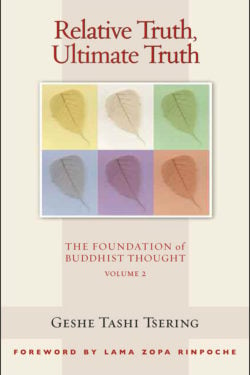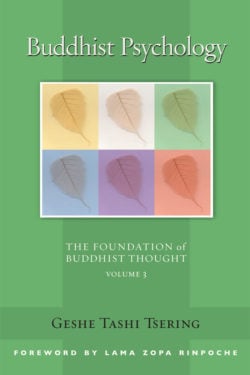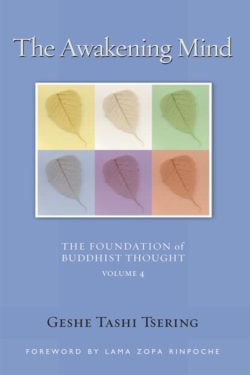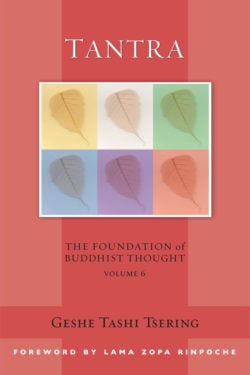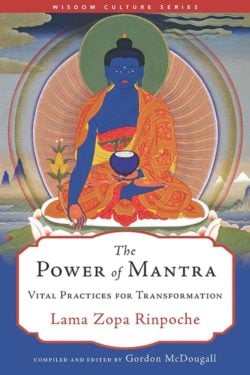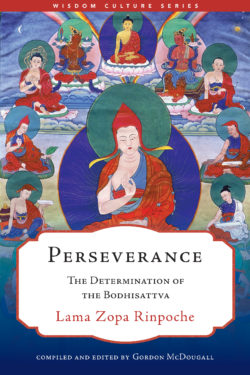Gordon McDougall

Gordon McDougall was director of Cham Tse Ling, the FPMT’s Hong Kong center, for two years in the 1980s and worked for Jamyang Buddhist Centre in London from 2000 to 2007. He helped develop the Foundation of Buddhist Thought study program and administered it for seven years. Since 2008 he has been editing Lama Zopa Rinpoche’s lamrim teachings for Lama Yeshe Wisdom Archive’s FPMT Lineage series.
Books, Courses & Podcasts
Relative Truth, Ultimate Truth
Printed on demand. This book will be printed especially for you and will ship from a separate warehouse.
Relative Truth, Ultimate Truth is a clear and remarkably practical presentation of a core Buddhist teaching on the nature of reality. Geshe Tashi Tsering provides readers with an excellent opportunity to both enhance their knowledge of Buddhism and deepen their perspective on the world.
The Buddhist teaching of the “two truths” is the gateway to understanding the often-misunderstood philosophy of emptiness. This volume is an excellent source of support for anyone interested in cultivating a more holistic and transformative understanding of the world around them and ultimately of their own consciousness.
Buddhist Psychology
This new volume from the Foundation of Buddhist Thought series, provides a stand-alone and systematic—but accessible—entry into how Buddhism understands the mind. Geshe Tashi, an English-speaking Tibetan monk who lives in London, was trained from boyhood in a traditional Tibetan monastery and is adept in communicating this classical training to a modern Western audience.
Buddhist Psychology addresses both the nature of the mind and how we know what we know. Just as scientists observe and catalog the material world, Buddhists for centuries have been observing and cataloging the components of inner experience. The result is a rich and subtle knowledge that can be harnessed to the goal of increasing human well-being.
The Awakening Mind
Bodhichitta, often translated as “great compassion,” is the gem at the heart of Buddhism. From this altruistic desire to serve others, all other Buddhist practices naturally flow, therefore, this state of mind is one Buddhists should understand and cultivate. In The Awakening Mind, Geshe Tashi Tsering leads us through the two main methods to develop bodhichitta that have been developed by the great Indian and Tibetan Buddhists over the centuries: the seven points of cause and effect, and equalizing and exchanging the self with others.
This is the fourth release from Geshe Tashi’s Foundation of Buddhist Thought series, which individually and collectively represent an excellent introduction to Tibetan Buddhism. These unique and friendly books are based on the curriculum of a popular course of the same name, developed by Geshe Tashi himself.
Geshe Tashi’s presentations combine rigor and comprehensiveness with lucidity and accessibility, never divorced from the basic humanity and warmth of his personality. In Geshe Tashi, we encounter the new generation of Tibetan monk-scholars teaching in the West who are following in the footsteps of such revered and groundbreaking teachers as Geshe Wangyal and Geshe Sopa.
Tantra
In this sixth and final volume in the Foundation of Buddhist Thought series, Geshe Tashi Tsering brings his familiar, helpful approach to the esoteric practices of Buddhist tantra. Anticipating the many questions Westerners have upon first encountering tantra’s colorful imagery and veiled language, Tantra uses straight talk to explain deities, initiations, mandalas, and the body’s subtle physiology of channels and chakras.
Tantric Buddhism provides a quick avenue to buddhahood by means of dissolving the body’s wind energies into the central channel at the heart, mimicking the transformations of consciousness that occur at the time of death. Guiding readers systematically from tantra’s generation stage through to the full enlightenment of the completion stage, Geshe Tashi Tsering even unpacks a simple compassion practice composed by the Dalai Lama, using it to illustrate the building blocks common to all such visualization techniques.
Tantra is a fitting conclusion to this accessible and practical series.
The Power of Mantra
Energize your practice with the potent energy of mantra.
In this book, beloved teacher Lama Zopa Rinpoche guides us through the most popular mantras in Tibetan Buddhism: Shakyamuni Buddha, Chenrezig, Manjushri, Tara, Medicine Buddha, Vajrasattva, and more.
A mantra—literally “that which protects the mind”—is a series of Sanskrit syllables that evoke the energy of a particular buddha or bodhisattva. It works as a sacred sound that brings blessings to ourself and others, and as a tool to transform our mind into one that is more compassionate and wise.
In clear and succinct teachings, Lama Zopa shows us why we need different mantras and how each mantra works. He also explains their importance and power, giving specific instructions for practicing them. The exquisite, full-color illustrations of the deities that accompany the text make this book a beautiful guide, one suitable for both beginners and experienced practitioners.
The Wisdom Culture Series, published under the guidance of Lama Zopa Rinpoche, provides English-language readers with key works for the study and cultivation of the Mahayana Buddhist path, especially works of masters within the lineage of Lama Tsongkhapa and the Geluk school of Tibetan Buddhism.
Perseverance
Dive deep into perseverance, one of the core practices of the bodhisattvas, with beloved teacher Lama Zopa Rinpoche as a guide.
Awakening depends on fortitude;
because, without fortitude there is no merit,
as there is no movement without wind.
—Shantideva, Guide to the Bodhisattva’s Way of Life
Perseverance, or virya, is also translated as “energy,” “fortitude,” or “vigor.” One of the six perfections, or paramitas, it is one of the trainings of the bodhisattvas and a deeply necessary quality for the Buddhist path. But it’s far from the kind of head-down, stubborn determination the name could imply; instead, it’s joyful energy that enables us to practice.
Rinpoche’s commentary is structured around the fifth and seventh chapters of the beloved Guide to the Bodhisattva’s Way of Life by the eighth-century philosopher-poet Shantideva. Interweaving his teaching with Shantideva’s verses, Rinpoche elucidates this prerequisite for enlightenment, explaining what it is and how to cultivate it: guard your mind, gather virtue, work for others—and find incredible joy in these things.
“When we have perseverance, we will have no obstacles, which means obstacles to any happiness, especially to ultimate happiness, the freedom from the oceans of samsaric suffering, and most importantly to peerless happiness, the state of the omniscience that is enlightenment.”
—Lama Zopa Rinpoche
The Wisdom Culture Series, published under the guidance of Lama Zopa Rinpoche, provides English-language readers with key works for the study and cultivation of the Mahayana Buddhist path, especially works of masters within the lineage of Lama Tsongkhapa and the Geluk school of Tibetan Buddhism.

